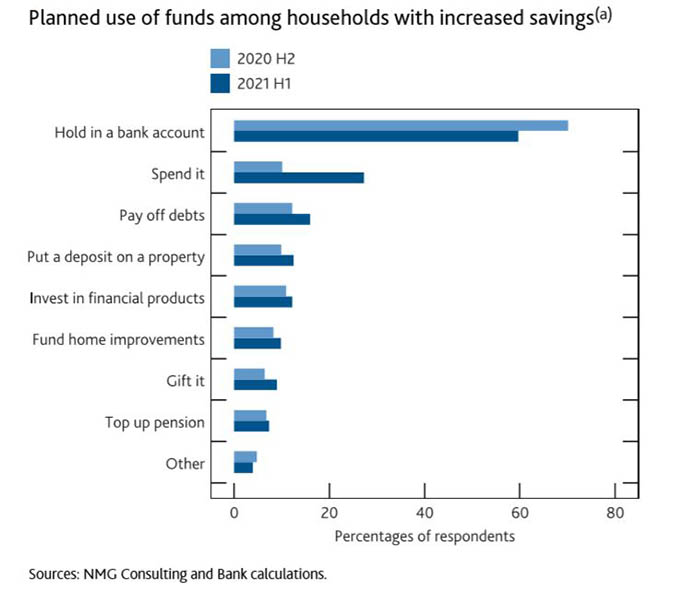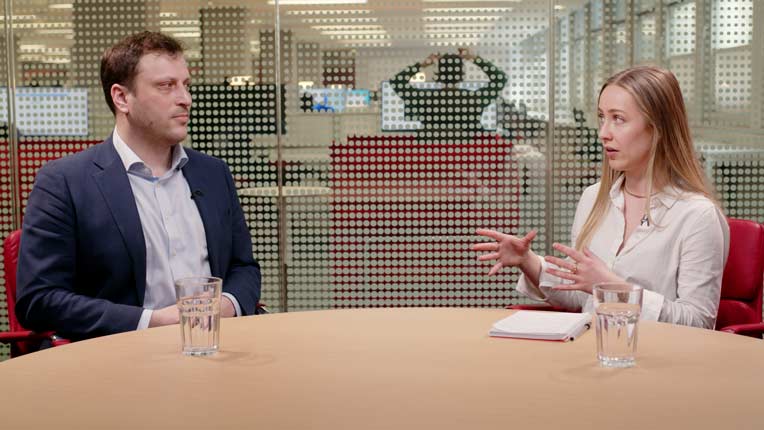
UK value stocks are on a hot streak so far this year, suggesting that investors are expecting economically sensitive companies to thrive as the UK economy fires up again.
We’ve looked at why at the best performing funds so far this year have been UK focused and, in an article on consumer trends, how the British shopper is likely to react to the re-opening of parts of the economy. Will this pent-up demand lead to “revenge spending” as consumers splurge some of the billions saved during lockdown - and will this lead Briton out of 2020's slump?
We asked two stock-picking UK managers, Alexandra Jackson at Rathbone UK Opportunities and Ed Legget at Artemis UK Select, how they plan to position for a recovery this year and what other scenarios investors should plan for.
5 Questions for 2021 and Beyond
How Long Will the Boom Last?
The Bank of England’s forecast for 7.5% growth is based partly on the idea that UK consumers will spend their way out of last year’s crisis. These expectations have already driven many UK stocks higher this year, with the Morningstar UK index already up nearly 9% this year. The big question is how long this will continue and whether it can make up for the economic output lost in 2020.
Artemis’s Legget thinks this lost GDP can be made up very quickly. “You’re likely to see elevated spending [from consumers] for quite a long period of time," he says, and expects shoppers to take up to three years to spend the excess cash saved during the pandemic. Rathbone’s Jackson thinks the recovery may be more shortlived and the UK, after a short expansion, will drop back to the anaemic growth seen before the pandemic. “It’s not going to be this mad rush that lasts forever,” she says.
Will Inflation Crash the Party?
Annual inflation more than doubled in the UK last month to 1.5%, and investors are watching the rise in the cost of living in economies like the UK and US closely. House prices and share prices alike have been booming across the world as consumers take advantage of cheap money and government stimulus (US citizens have enjoyed so-called "helicopter money" in the form of cheques worth thousands of dollars since the pandemic started).
An increase in interest rates usually follows a surge in inflation, but central banks have signalled they are prepared to let economies “run hot” before intervening. Any increase in UK interest rates is likely to be modest anyway, Legget says, adding that households generally can absorb higher mortgage costs, especially if the job market continues to improve.
Will We Save Rather Than Spend?
“If the consumer is feeling remotely positive about life, and they’re not going to lose their job imminently, they broadly spend every penny they have,” Artemis's Legget says. The Bank of England’s latest research suggests a sharp increase in those who intend to spend their excess cash:

While fewer people today plan to hold the money in the bank than a year ago, the research suggests 60% will still keep their cash.
The pandemic may have spurred some people to spend money they couldn’t last year, but it may also have been a sobering financial experience for some, Jackson says. “What we tend to see after really tough periods like last year is that people tend to raise their savings rate,” she says (a savings rate is the proportion of your income you save). Excess cash will go into the economy, she predicts, but many consumers will also have enjoyed having lower outgoings and reducing their debt. In the US, where the government has been giving people cash to tide them over, the data suggests that over time less of this was spent and more was saved.
Stocks for the Recovery and Stocks to Avoid?
As stock markets are generally forward looking, is it too late for investors to capture the value bounce in airlines, leisure, pub and retail stocks? “It’s about travelling rather than arriving in the UK market,” Jackson says, and that’s why she’s avoided pub and hotel chains – whose share prices barely moved on the “grand re-opening” day of May 17 but are big gainers this year.
Instead she is playing the re-opening trade via retailer JD Sports (JD.), sausage roll and pasty chain Greggs (GRG) and Fevertree (FEVR), which should benefit from the re-opening of bars and restaurants. One stock she owns that hasn’t rallied yet is Johnson Service Group (JSG), which rents tablecloths, workwear and bed linen to the hospitality trade. This stock should do well even if the recovery isn't quite as dramatic as some are predicting, she says.
Artemis’s Legget owns housebuilders, expecting some of that excess cash to find its way into the housing market. He holds names like Vistry (VTY), which owns Bovis and Linden Homes, as well as Persimmon (PSN), whose shares are up nearly 50% year-on-year. While he thinks Britons will be doing less DIY as pubs and restaurants re-open, there is one lockdown trend he expects to persist: online gambling.
He points to Australia, where online gambling spend has remained strong into this year even while the country has quickly started to "normalise" post-Covid. Ladbrokes owner Entain (ENT) is among the fund’s top 10 holdings, as well as 888 Holdings (888) and Flutter Entertainment (FLTR), which has operations in Australia and the US.
What Are the Risks?
The outbreak of new Covid-19 variants has created uncertainty about whether the UK will emerge fully from lockdown in June. Any lockdowns this year, whether regional or national, could disrupt the narrative of the consumer boom. “The risks are all around Covid variants,” says Legget, but he expects that rather than shut down the whole economy again, UK authorities will target specific outbreak areas to contain the spread of the virus – as has been the approach in the US, where the consumer boom is more advanced than in Europe.
Meanwhile, Jackson says the problem with UK economic forecasts is that they ignore the wide variety in pandemic impacts across the regions. London hotel bookings will show different profiles to those in Lancashire, for example, where the current outbreak is concentrated.




























